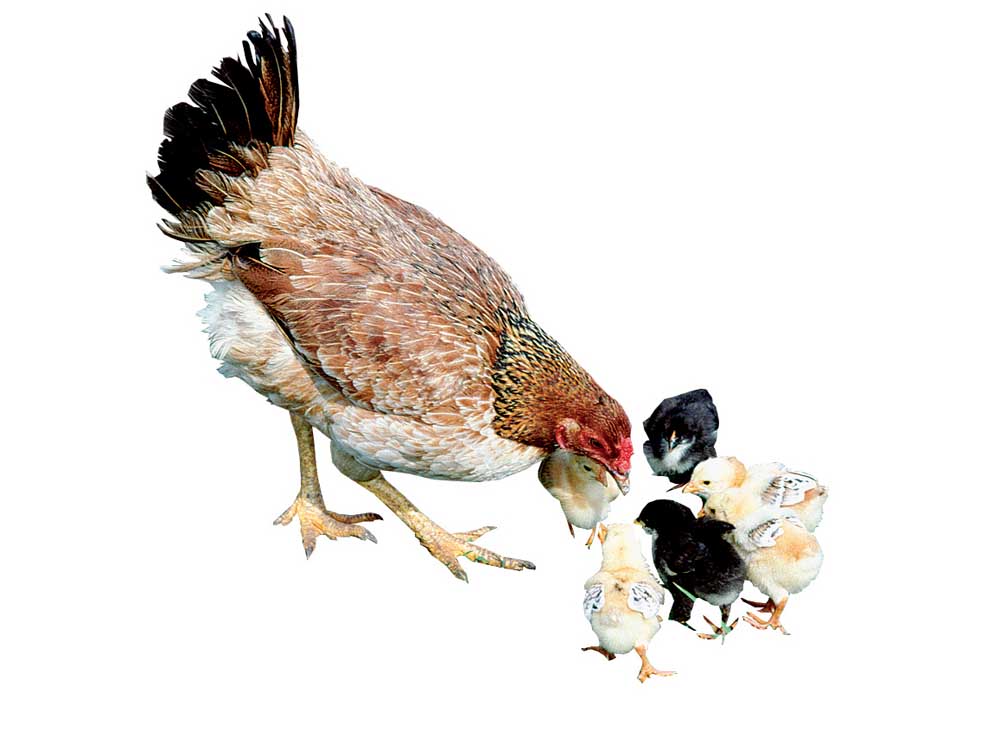Bird flu: How to protect your chickens
Published 12:41 am Saturday, March 7, 2015

- File photoHen and chicks foraging in grass
The first case of bird flu in Central Oregon, and only the second case in the state, has resulted in a quarantine zone covering the northern half of Bend and questions from backyard chicken owners about how to protect their birds.
A flock of about 90 birds, including chickens, ducks and turkeys, kept on a property near Tumalo was found to have bird flu, the Oregon Department of Agriculture announced Feb. 13. The agency has not released the name of the bird’s owner. Since then the birds have been killed, the property cleaned up and a nearly 120-square-mile quarantine area established, said Bruce Pokarney, spokesman for the Department of Agriculture in Salem.
Trending
“We haven’t seen any indication of any spread,” he said.
But that does not mean there is no more danger of bird flu. People who have chickens and other domestic birds in the quarantine area must acquire a permit from the Department of Agriculture to move birds in or out of the area until the quarantine is lifted. If there are no more cases detected in the area, the quarantine should be lifted Wednesday, said Madeline Benoit, avian health coordinator for the Department of Agriculture in Salem.
People may still buy chicks in and outside the quarantine area in Central Oregon, she said.
“Chick sales are still going on,” she said. “They are not halting, we just have to be careful.”
This time of year is when ranch supply shops and other chicken vendors sell chicks. As the popularity of backyard birds has grown in recent years, so have the sales, said Joel King, lawn and garden specialist at High Desert Ranch & Home in northeast Bend. The shop has already sold 1,400 chicks so far this year and last year sold 3,100.
“We’re OK to sell birds,” King said.
Trending
Eggs produced in the quarantine area may also still be sold. The Department of Agriculture has stated that this strain of bird flu, which presents a low risk to public health, does not taint eggs or meat from domestic birds.
Wild waterfowl, such as ducks, carry the strains of bird flu that showed up near Tumalo. The virus doesn’t affect the wild waterfowl, but may quickly kill domestic birds. The first case of bird flu infecting backyard birds in Oregon was in December in Douglas County.
The property near Tumalo and the property in Douglas County have ponds and the domestic birds at both mingled with wild waterfowl, Benoit said.
While chicken owners often like to give their birds free range, she recommended keeping chickens and other backyard birds locked up for now, particularly if there are ponds or places where migrating birds gather on the property.
This is just the first in a list of “biosecurity ” steps Benoit said chicken owners should take.
Other steps include limiting the number of people who visit the birds, keeping new birds away from the flock for 30 days before introducing them to the coop and not borrowing tools and equipment from other bird owners.
Benoit also said bird owners should have a designated pair of shoes they use when entering their coop.
“They stay at home and you don’t do anything else with them,” she said of the shoes.
These tips could also protect chickens and other domestic birds from other illnesses, Benoit said. She noted that the strain of bird flu detected in Central Oregon is not a risk to people, cats or dogs.
Bird flu’s appearance in Central Oregon nearly postponed an annual tour of chicken coops around Bend, but the organizers decided this week to hold the early May event. The fifth annual Bend’s Chicken Coop Tour is set to run from 10 a.m. to 4 p.m. May 9, said Rebecca Charlton, owner of Cowgirl Cash. The downtown Bend boutique is the title sponsor for the tour.
Due to the bird flu, the coop tour this year will include shoe-washing stations at each stop, she said, “because you don’t want to spread sickness from one person’s coop to another person’s coop.”
Having owned chickens for three years, Charlton said she, like other chicken owners around Central Oregon, has been studying up recently on bird flu and taking the steps recommended by agriculture officials.
“The worst thing in the world would to be to go out to your coop and find a dead chicken,” Charlton said.
— Reporter: 541-617-7812, ddarling@bendbulletin.com
Tip to protect your birds
Bird flu spreads quickly by direct bird-to-bird contact. The virus may also be carried by manure, tools, equipment, vehicles, egg flats, crates, clothing and shoes.
• Restrict access to birds and keep your birds away from other birds.
• Regularly clean and disinfect equipment. Wash hands before and after handling birds.
• Buy birds from a reputable source and keep any new birds separated from your birds for 30 days.
• Do not share equipment or supplies with other bird owners.
• Check birds frequently for the warning signs and do not touch a dead bird if you find one.
• Report sick or dead birds to the Oregon Department of Agriculture by calling 800-347-7028.
Signs in birds
• Lack of energy
• Decreased egg production, soft-shelled or misshapen eggs
• Purple discoloration of wattles, combs and legs
• Runny nose, coughing and sneezing
• Stumbling and falling down
• Diarrhea
• Sudden death without any clinical signs
Source: Oregon Department of Agriculture








